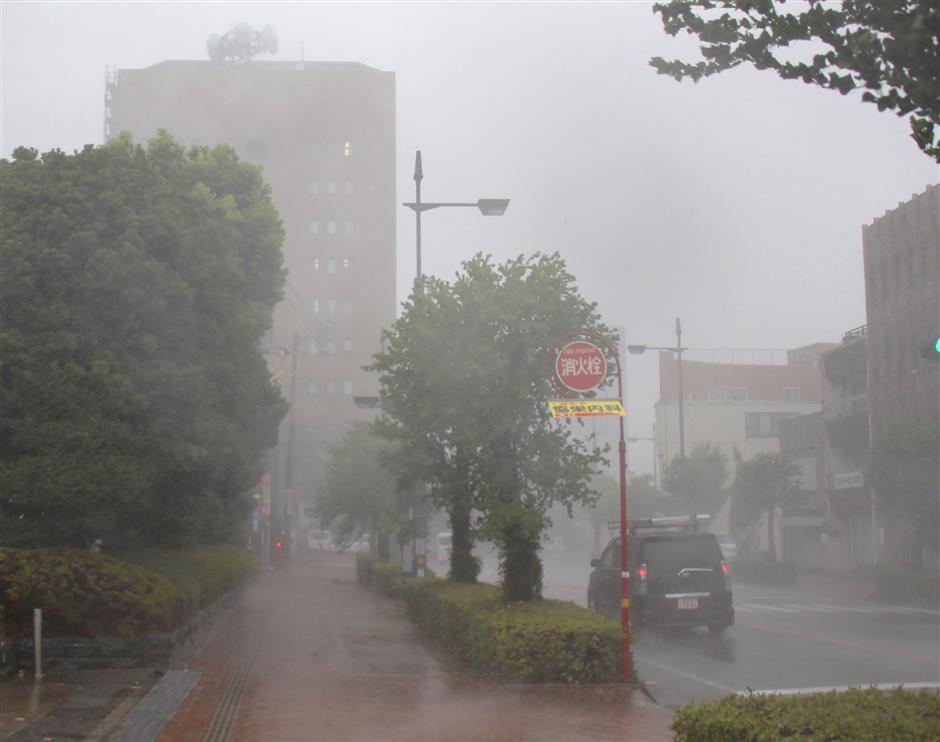2 killed, scores injured as most powerful typhoon in 25 years strikes Japan

Heavy rain and winds caused by Typhoon Jebi hit the city of Tokushima in Tokushima prefecture on September 4, 2018.
Typhoon Jebi, the most powerful typhoon to make landfall in Japan in 25 years, struck western Japan on Tuesday, wreaking havoc on buildings, infrastructure and transportation systems and leaving at least two people dead and injuring 97 others, according to public broadcaster NHK.
The Japan Meteorological Agency (JMA) said that after making landfall in the southern part of Tokushima Prefecture, the typhoon passed near Kobe and moved into the Sea of Japan.
Numerous flights, train services and highways were closed in the Kinki region and beyond, and shops, factories and other facilities, particularly in western Japan, were closed, including the popular Universal Studios attraction in Osaka prefecture.
At Kyoto Station a number of people were injured when a piece from a glass ceiling collapsed due to the powerful winds, according to local police reports.
The powerful typhoon forced Kansai International Airport in western Japan to halt its operations at midday as high waves caused by the typhoon saw the airport become inundated with water.
The airport's operator said that large areas of the airport have been submerged, including runways, parking spaces and passages to buildings in the basement of the facility.
According to the Japan Coast Guard, powerful gusts of winds blew a tanker into a bridge that connects the airport with Izumisano City.
Both the bridge and tanker were damaged in the incident.
The vessel, used to carry fuel to the airport, was moored at the time of the accident. The tanker had finished carrying fuel to the airport, but the winds were powerful enough to break its moorings and smash the vessel into the bridge.
The coast guard said, however, that none of the 11 stranded crew members aboard the tanker were injured.
The coast guard added that dozens of other ships have been swept away in Osaka port by the powerful winds, although there have been no reports of injury to crew members as a result.
A number of high-sided trucks in western Japan were tipped over on a highway by the powerful winds, local police said, with one truck almost completely blown off a bridge connecting Shikoku island and the main island of Honshu, local media reported.
Typhoon Jebi was traveling at a speed of 65 km per hour in the sea off Fukui city and packing winds of up to 180 kph with an atmospheric pressure of 965 hectopascals at its center as of 4 p.m. local time, the Japan Meteorological Agency said.
Due to the effect of the westerly jet stream, the weather agency said Jebi is picking up speed. The typhoon is forecast to hit west Hokkaido, although other northerly regions are bracing for impact, with Aomori Prefecture setting up evacuation centers at six different locations, according to local media reports.
Japanese Prime Minister Shinzo Abe was due to visit southwestern prefectures on Tuesday, but his plan was canceled due to the severity of the typhoon.
The prime minister, in a disaster response meeting, pledged to remain alert in dealing with the impact of the typhoon. Abe urged members of the public to listen for evacuation orders, warnings and advisories and if necessary evacuate as early as possible.
The powerful typhoon has heavily disrupted transportation services, causing flights and rail services to be canceled, as well as some commercial facilities' operations.
More than 700 local and international flights have been canceled by domestic airlines, and Japan's top two carriers, All Nippon Airways Co and Japan Airlines Co, have canceled 289 and 218 flights each.
The Tokaido Shinkansen and Sanyo Shinkansen bullet train lines had some services suspended by railway operators and parts of major highways have also been closed, the transport ministry said.
Some stores in Osaka and Kyoto prefectures as well as in other parts of western Japan have shut down operations for the day and Toyota Motor Corp. said it will halt its nighttime operations at 14 factories across the country, particularly those in western and northern areas.
According to the JMA, up to 500 mm of rain is forecast to fall in central Japan and up to 400 mm in western Japan in the 24-hour period through 6 a.m. local time on Wednesday.
Tokyo, Japan's capital, has felt the peripheral gusts of Typhoon Jebi, the JMA said.
At an emergency press briefing on Monday, an official from the Japan Meteorological Agency was quoted as saying that the typhoon has been categorized as "very strong" by the agency and based on the strength of its top winds, would be the strongest typhoon to make landfall in Japan since 1993.
By Wednesday, Typhoon Jebi should be downgraded to an extra-tropical cyclone, the JMA said.















